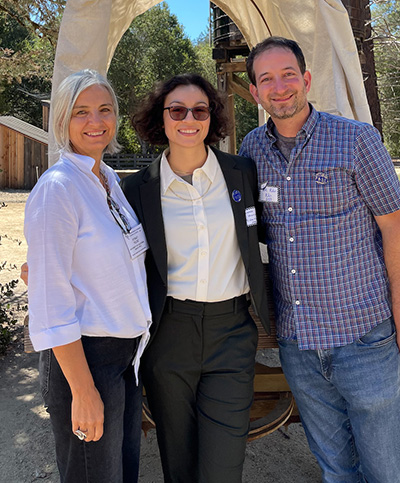The Howard Hughes Medical Institute (HHMI) has awarded a prestigious Gilliam Fellowship for Advanced Study to UC Santa Cruz graduate student Vanessa Mariscal. The Gilliam Fellowship program provides awards to graduate students conducting outstanding research in their scientific fields and their advisers who are committed to building a more inclusive scientific ecosystem.
Mariscal is working with Fitnat Yildiz, professor of microbiology and environmental toxicology, and Seth Rubin, professor of chemistry and biochemistry, to study biofilm formation in the bacteria that cause cholera. Biofilm formation enhances environmental survival and infectivity of the cholera bacteria (Vibrio cholerae). The aims of Mariscal’s research are to understand the molecular signaling mechanisms involved in the regulation of biofilm formation, and to identify potential targets for inhibitors to disrupt biofilm formation.
Mariscal got interested in microbiology and biofilms as an undergraduate at Cal Poly San Luis Obispo, where she earned her B.S. in biological sciences and microbiology. She came to UC Santa Cruz in 2020 and was excited to work on biofilms in the Yildiz lab. Yildiz suggested she spend some time in Rubin’s lab learning techniques for working with proteins, and they are now both advising Mariscal on her thesis research.
“They are both amazing mentors and are very passionate about their research, and I’m enjoying working with them,” Mariscal said. “Being co-mentored has provided me with the opportunity to step out of my comfort zone and learn biochemical methods and principles that complement the bacterial genetics research conducted in the Yildiz lab.”
HHMI recognizes that the advisers of Gilliam Fellows play an important role in helping the students realize their high potential. The Gilliam Program invests in graduate students from populations historically excluded and underrepresented in science so that they are prepared to become scientific leaders.
Becoming part of a diverse, supportive, and strong community of scholars is an important aspect of the program. Gilliam Fellows attend an annual meeting and participate in HHMI leadership training, which gives them tools to use their strengths and experiences to the benefit of science, to influence the environment, maximize their collaborations, and elevate their voices as scientific leaders.
"It’s an incredible opportunity to meet other scientists from underrepresented groups in STEM and to build a supportive network,” Mariscal said. “It’s a very welcoming community, and I’m looking forward to the leadership trainings and meetings we have coming up.”
The Gilliam Fellows receive an annual award totaling $53,000 for up to three years.
“To support the development of these students as future scientific leaders, it’s crucial to provide high-quality mentoring, financial support, an inclusive lab environment, and a supportive community,” said David Asai, senior director for science education at HHMI. “True change will not happen on campuses without the support and commitment of faculty and institutional leaders.”



